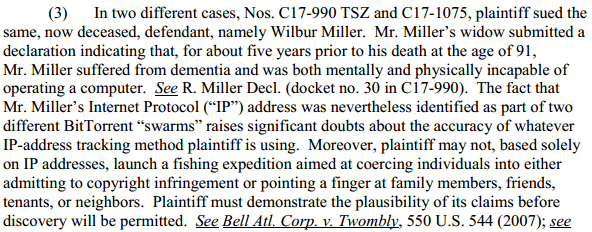In recent years, file-sharers around the world have been pressured to pay significant settlement fees, or face legal repercussions.
These so-called “copyright trolling” efforts have been a common occurrence in the United States for more than half a decade, and still are.
While copyright holders should be able to take legitimate piracy claims to court, there are some who resort to dodgy tactics to extract money from alleged pirates. The evidence isn’t exactly rock-solid either, which results in plenty of innocent targets.
A prime candidate for the latter category is a man who was sued by Venice PI, a copyright holder of the film “Once Upon a Time in Venice.” He was sued not once, but twice. That’s not the problem though. What stood out is that defendant is no longer alive.
The man’s wife informed a federal court in Seattle that he passed away recently, at the respectable age of 91. While age doesn’t prove innocence, the widow also mentioned that her husband suffered from dementia and was both mentally and physically incapable of operating a computer at the time of the alleged offense.
These circumstances raised doubt with US District Court Judge Thomas Zilly, who brought them up in a recent order (citations omitted).
“In two different cases, plaintiff sued the same, now deceased, defendant, namely Wilbur Miller. Mr. Miller’s widow submitted a declaration indicating that, for about five years prior to his death at the age of 91, Mr. Miller suffered from dementia and was both mentally and physically incapable of operating a computer,” the Judge writes.
The Judge notes that the IP-address tracking tools used by the copyright holder might not be as accurate as is required. In addition, he adds that the company can’t simply launch a “fishing expedition” based on the IP-address alone.
“The fact that Mr. Miller’s Internet Protocol (‘IP’) address was nevertheless identified as part of two different BitTorrent ‘swarms’ raises significant doubts about the accuracy of whatever IP-address tracking method plaintiff is using.
“Moreover, plaintiff may not, based solely on IP addresses, launch a fishing expedition aimed at coercing individuals into either admitting to copyright infringement or pointing a finger at family members, friends, tenants, or neighbors. Plaintiff must demonstrate the plausibility of their claims before discovery will be permitted,” Judge Zilly adds.
Since the copyright holder has only provided an IP-address as evidence, the plausibility of the copyright infringement claims is not properly demonstrated. This means that the holder was not allowed to conduct discovery, which includes discussions with defendants.
The court, therefore, ordered Venice PI to cease all communication with defendants effective immediately, until further notice. This order applies to a dozen cases which are now effectively on hold.
The copyright holder has been given 28 days to provide more information on several issues related to the evidence gathering. This offer of proof should be supported by a declaration of an expert in the field.
The Judge wants to know if an IP-address can be spoofed or faked by a BitTorrent tracker, and if so, how likely this is. In addition, he questions if the material that was tracked (possible only part of a download) is actually playable. And finally, the Judge asks what other evidence Venice PI has against each defendant, aside from the IP-address.
“In the absence of a timely filed offer of proof, plaintiff’s claims will be dismissed with prejudice and without costs, and these cases will be closed,” Judge Zilly warns.
The harsh order was noticed by copyright troll skeptic FCT, who notes that Venice PI will have a hard time providing the requested proof.
Venice and other “copyright trolls” use the German company Maverickeye to track BitTorrent pirates on a broad scale. They are also active with their settlement demands in various other countries, most recently in Sweden.
If the provided proof is not sufficient in the court’s opinion, it will be hard for them and other rightsholders to continue their practices in the Washington district.
—
The full order is available here (pdf).


 In recent years, file-sharers around the world have been pressured to pay significant settlement fees, or face legal repercussions.
In recent years, file-sharers around the world have been pressured to pay significant settlement fees, or face legal repercussions.




